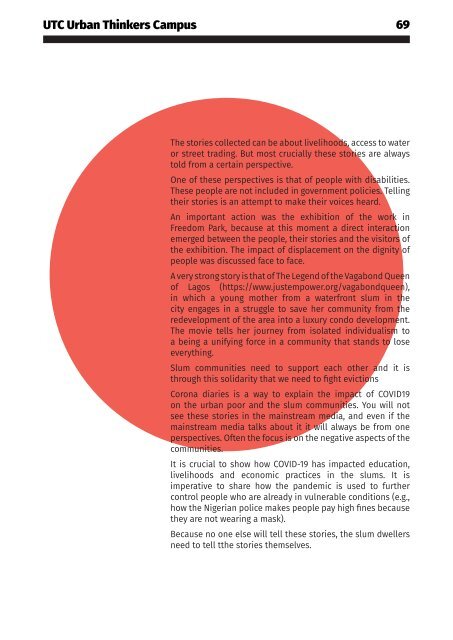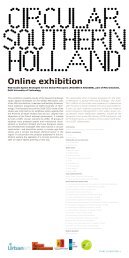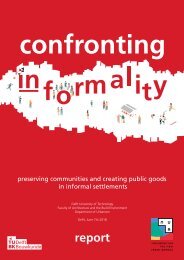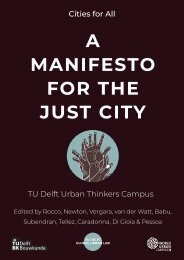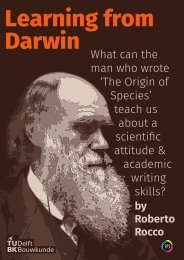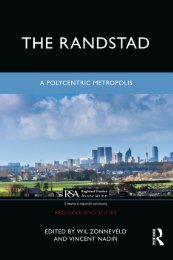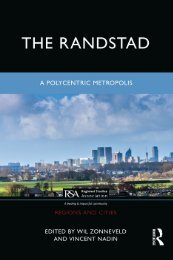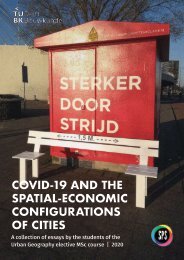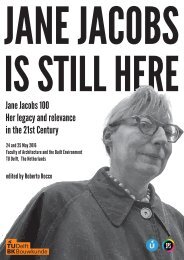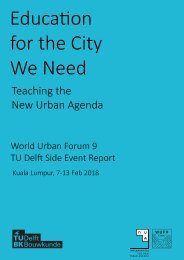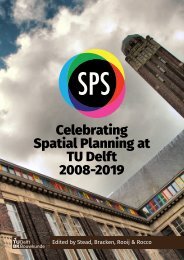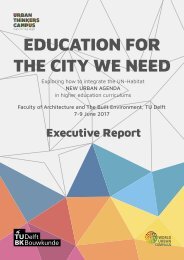The New Urban Normal Urban Sustainability and Resilience Post COVID-19
The COVID19 pandemic has exposed several systemic failures and injustices in the way cities are planned and designed around the world. It has also exposed the failings due to lack of planning in most places in the Global South. Careful, inclusive and participatory spatial planning is thought to greatly strengthen the capacity of societies to withstand systemic shocks, as testified by the New Urban Agenda (2016), the Pact of Amsterdam (2016) and the New Leipzig Charter (2020). Integrated affordable housing, for instance, has come to the top of the agenda once again, now propelled by the realisation that slum dwellers (a staggering 1 billion people around the world) and homeless people are particularly vulnerable to health crises and other societal shocks. The pandemic has been saluted as an opportunity to implement far-reaching transformation of our societies towards sustainability and justice, but little signs of systemic change have actually surfaced. For example, several cities around the world claim they will overhaul public space, take space from private cars, and invest more on green spaces, bicycle paths and quality public mobility. But little has been said about addressing the structural causes of inequality. The champions of the circular economy salute the pandemic as a new dawn for more human-centred capitalism, for the abandonment of exploitation and unfair distribution, and a world where workers can find decent housing, health, work and leisure. But what is actually happening on the ground?
The COVID19 pandemic has exposed several systemic
failures and injustices in the way cities are planned and
designed around the world. It has also exposed the failings
due to lack of planning in most places in the Global South.
Careful, inclusive and participatory spatial planning is
thought to greatly strengthen the capacity of societies to
withstand systemic shocks, as testified by the New Urban
Agenda (2016), the Pact of Amsterdam (2016) and the New
Leipzig Charter (2020). Integrated affordable housing, for
instance, has come to the top of the agenda once again,
now propelled by the realisation that slum dwellers (a
staggering 1 billion people around the world) and homeless
people are particularly vulnerable to health crises and
other societal shocks.
The pandemic has been saluted as an opportunity to
implement far-reaching transformation of our societies
towards sustainability and justice, but little signs of systemic
change have actually surfaced. For example, several cities
around the world claim they will overhaul public space,
take space from private cars, and invest more on green
spaces, bicycle paths and quality public mobility. But little
has been said about addressing the structural causes of
inequality. The champions of the circular economy salute
the pandemic as a new dawn for more human-centred
capitalism, for the abandonment of exploitation and unfair
distribution, and a world where workers can find decent
housing, health, work and leisure. But what is actually
happening on the ground?
You also want an ePaper? Increase the reach of your titles
YUMPU automatically turns print PDFs into web optimized ePapers that Google loves.
UTC <strong>Urban</strong> Thinkers Campus 69<br />
<strong>The</strong> stories collected can be about livelihoods, access to water<br />
or street trading. But most crucially these stories are always<br />
told from a certain perspective.<br />
One of these perspectives is that of people with disabilities.<br />
<strong>The</strong>se people are not included in government policies. Telling<br />
their stories is an attempt to make their voices heard.<br />
An important action was the exhibition of the work in<br />
Freedom Park, because at this moment a direct interaction<br />
emerged between the people, their stories <strong>and</strong> the visitors of<br />
the exhibition. <strong>The</strong> impact of displacement on the dignity of<br />
people was discussed face to face.<br />
A very strong story is that of <strong>The</strong> Legend of the Vagabond Queen<br />
of Lagos (https://www.justempower.org/vagabondqueen),<br />
in which a young mother from a waterfront slum in the<br />
city engages in a struggle to save her community from the<br />
redevelopment of the area into a luxury condo development.<br />
<strong>The</strong> movie tells her journey from isolated individualism to<br />
a being a unifying force in a community that st<strong>and</strong>s to lose<br />
everything.<br />
Slum communities need to support each other <strong>and</strong> it is<br />
through this solidarity that we need to fight evictions<br />
Corona diaries is a way to explain the impact of <strong>COVID</strong><strong>19</strong><br />
on the urban poor <strong>and</strong> the slum communities. You will not<br />
see these stories in the mainstream media, <strong>and</strong> even if the<br />
mainstream media talks about it it will always be from one<br />
perspectives. Often the focus is on the negative aspects of the<br />
communities.<br />
It is crucial to show how <strong>COVID</strong>-<strong>19</strong> has impacted education,<br />
livelihoods <strong>and</strong> economic practices in the slums. It is<br />
imperative to share how the p<strong>and</strong>emic is used to further<br />
control people who are already in vulnerable conditions (e.g.,<br />
how the Nigerian police makes people pay high fines because<br />
they are not wearing a mask).<br />
Because no one else will tell these stories, the slum dwellers<br />
need to tell tthe stories themselves.


